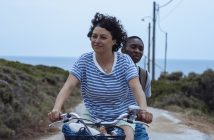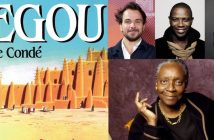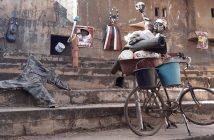It is the story of our parents, it concerns thousands even millions of people and that is the aspect of memory I wanted to reveal, this chapter of history, unknown in France but also unknown in many north-African and African countries at large. This is what really truly interested me.
At the moment, there are in France big discussions about immigration laws but in fact I started this film four years ago. So the film fancied a crossroad about a debate, about how old colonies and France should find the right balance between what society knows and what it should know. It is the time to find a solution and to find things then which finally resolve the debate and makes it clear to everybody else in France.
For the only survivors who at 60 years old got trapped by their own ideology, for such a hundred of people in Bordeaux, in Nantes, in Paris, in Mulhouse but also in Africa, it is the time now to be recognized. For the history, some of them went last night in Cannes, they were there and they were moved, they cried, despite it all they said « if it was to be redone, yes we would do it ». Because this meant for them a moment of true encounter with the French people, they shared their food, they slept at people’s house, they married French women. It was an incredible epic in their lives and yesterday, despite they wait the pension that is not still solved, they were crying and touched and moved.
In fact, each of the actors shared the same history, this is their history, the history of the immigration of their parents. So this is part of their memories, some elements not being that clear in terms of memory. Some of them had old grand-parents that were there, and I had myself my uncle who did the war in Indochina for instance. It was to show how these men and history opened this part of the French History, but also are integrated and a chapter in French History. So it was important through this film to open up this chapter in the History, in a way it is like a chapter like Marie-Antoinette, it is part of French History. This story is part of that chapter with our vision.
It was a lot of talk, everyday, not only about the movie, the talks were beyond the movie, the film was only a medium. When they were shooting, it happened also that lot of people came on the shoot just to really talk and share the emotions and share this frame of History. And yesterday as they were in Cannes and on the « marches », what they wanted to show was how much of the chapter of history they represented. And all those people that came with him last night, they fought on these beaches, some of them died on these very beaches here, so yesterday it was not part of a competition thing, the thing was being there and sharing the emotion of it all.
About some very important historical facts such as Sétif which are not in the script, this is a choice of the script. First, Sétif and events of Sétif were in the script. This was going in a way too far, that it deserved another story, another chapter that he would tell later on. Because all these scenes of going back to Algeria, describing Sétif in the History, are already written but it would have been in a way another film. This film should end with this 60 old man in this room, alone. This was the point of this particular film, this was a choice as a filmmaker.
Absolutely, until last night ! (screening in Cannes). Nobody wished to be a leader but I had to be a leader, carrying us all where the film was leading us. We shared very important things, it was important to give a guidance, to give a structure, to remain within this guide lines that I wished for this film. Four months, over 200 men on the set, so it was very important to impose, eventhough in a very warm way, some guide line. And they imposed themselves to be loyal and faithfull to my vision during the shooting.
The epic dimension and the music are very different from « Little Senegal ». Yes, I wanted to give a new treatment for this film which was no longer like a very strict, sober treatment that I had before. Here I wanted to really show the encounter between the French people, the North-Africans, the Africans and to show all the partners that had in common this history. With scenes of war, fully heroic characters, so it was a very wish to be both epic and very popular but in a good sense, not in a scornful sense, because I didn’t feel I wanted to be caged into a sort of naturalistic or realistic story. This is the ambition to include it all, to advance history and to have this epic that mentioned so that in five years this film will be shown on French television, German television, all these televisions along side films such as « Saving private Ryan », « A bridge too far », etc.. So it was the must to have this epic scale to meet at the same time the audiences and the reality of what he wanted to say as a director, as an attempt to branch into a new style of directing as well.
What was interesting is that I had written several possible endings for the film and especially because it was the sixtiest anniversary as we know. But I preferred to give time for thinking about it and then shoot the final scene. So I kept not all the scenes I had written and I took another six months until I shot the final ending of this film.
There were so many possibilities, for instance I could have structured the film differently, I could have thought of a flash-back structure with this old man journey which would have been included in this film very differently and follow a man today through history and the past events because what is important in this film is to say that what we learned and what we know about the past also informs the present and makes you think about the future. So it was an important way for me to decide which one I wanted to end.
I wanted to reach only positive characters to be in the film simply because the soldiers I met while preparing the film all told me that they shared the same thing. In a way, Martinez shared with them, he shared this common fear of the battle and the death. So eventhough there was hierarchy, you had the French soldiers, you had, like Martinez, the « Pieds-noirs », the North-Africans that lived there, and then you had like a third class, so to speak, which was indigenes. But this hierarchy disappears while they face the fear of death and the fear of the battle. And this is what I meant to say that all of them really are equal at that moment in the face of history.
///Article N° : 5749








